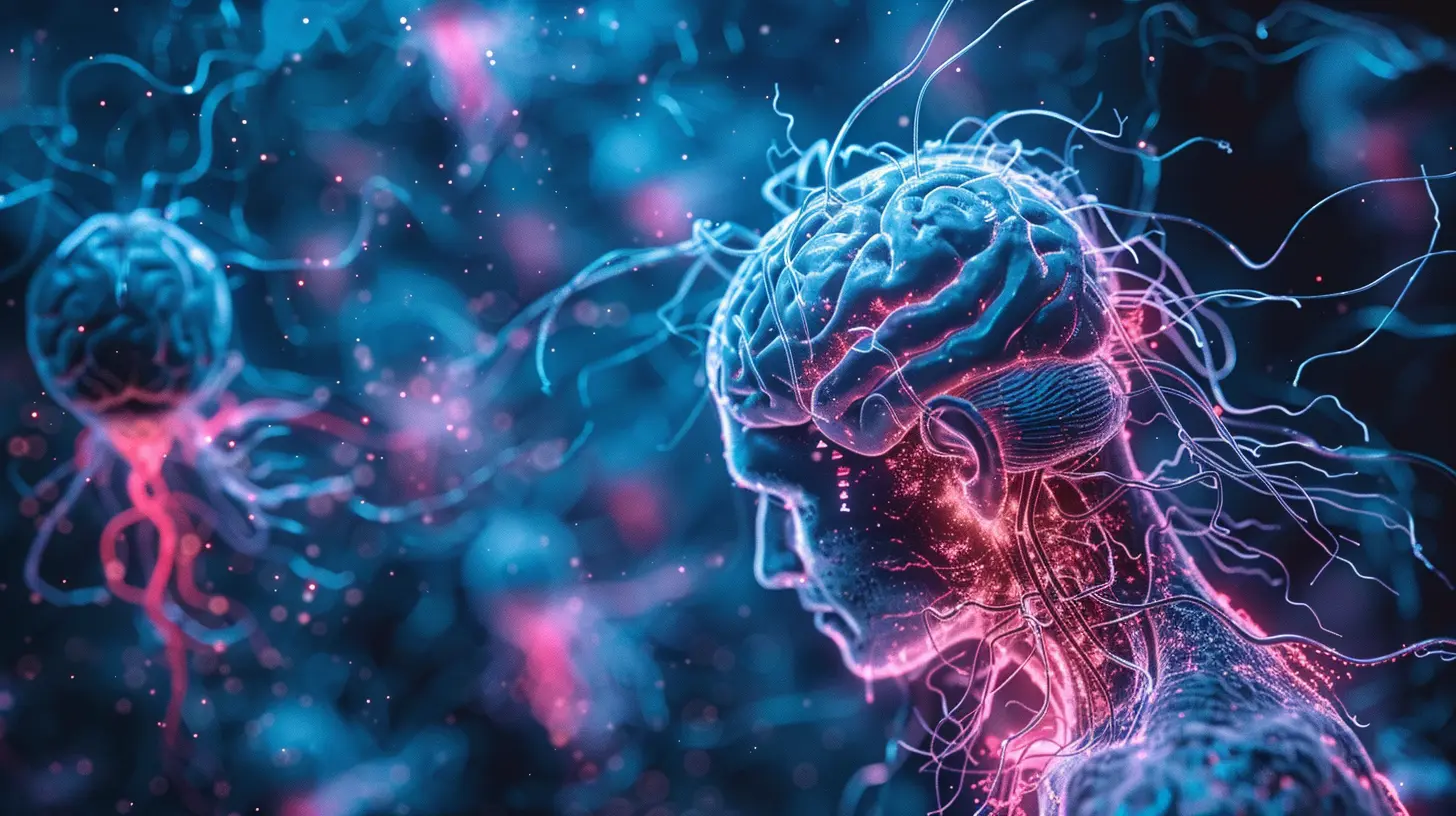The Connection Between Brain Inflammation and Mental Illness
17 June 2025
When we think about mental health, we often focus on neurotransmitters, stress, or genetics. But what if there’s another crucial piece to the puzzle—one that’s been hiding in plain sight? That’s where brain inflammation comes in.
Recent research is uncovering a surprising link between inflammation and a variety of mental health disorders. Depression, anxiety, schizophrenia, and even bipolar disorder may all have ties to chronic inflammation in the brain. But what does that actually mean? And more importantly, what can we do about it?

What Is Brain Inflammation?
When we hear "inflammation," most of us immediately think of a swollen ankle or a sore throat. But inflammation isn’t just about injuries or infections—it plays a role in nearly every aspect of health, including the brain.Inflammation is the body's defense mechanism against harmful invaders like bacteria, viruses, or toxins. It’s usually a good thing—until it sticks around too long. Chronic inflammation is when the immune system stays activated longer than necessary, damaging healthy cells in the process.
In the brain, this can lead to serious consequences. The immune system releases inflammatory molecules called cytokines, which can interfere with normal brain function, disrupt neurotransmitters, and even contribute to the death of brain cells. Over time, this persistent state of inflammation may contribute to the development of mental illnesses.

How Brain Inflammation Affects Mental Health
1. Depression and Inflammation
Depression isn’t just about feeling sad—it’s a complex condition with biological, psychological, and environmental factors. Increasing evidence suggests that inflammation may be one of the biological triggers.Studies have found that people with depression often have higher levels of pro-inflammatory cytokines in their blood. This inflammation can interfere with serotonin production—the "feel-good" neurotransmitter responsible for regulating mood. Without enough serotonin, symptoms of depression can worsen.
Furthermore, inflammation can cause "sickness behavior", which mimics the fatigue, low energy, and social withdrawal seen in depression. Ever noticed how you feel mentally drained when you're physically sick? That’s inflammation at work.
2. Anxiety and the Immune Response
If you constantly feel on edge or struggle with chronic anxiety, inflammation might be playing a role. Research has shown that elevated inflammation levels may increase hyperactivity in the amygdala, the brain’s fear center. This makes people more prone to perceiving threats, leading to heightened anxiety.Additionally, inflammation can affect GABA (gamma-aminobutyric acid), a key neurotransmitter that helps calm the nervous system. When GABA levels drop, the brain goes into overdrive, making it difficult to relax or shut off worrisome thoughts.
3. Schizophrenia and Neuroinflammation
Schizophrenia is a severe mental disorder that impacts thoughts, emotions, and behavior. While its exact cause remains unknown, researchers suspect that neuroinflammation may contribute to the disorder.Studies have found increased levels of inflammatory markers in people with schizophrenia—particularly in early stages of the illness. Inflammation can disturb normal brain development, disrupt dopamine balance, and lead to cognitive impairments, all of which are characteristic of schizophrenia.
Some scientists believe that excessive inflammation during fetal development or early childhood may even increase the risk of schizophrenia later in life.
4. Bipolar Disorder and the Immune System
Bipolar disorder, characterized by extreme mood swings between depression and mania, is another condition linked to inflammation. Research suggests that during manic episodes, certain inflammatory markers are elevated. In depressive episodes, the immune system behaves differently, indicating a direct connection between inflammation and mood regulation.Inflammation may also contribute to brain fog, fatigue, and cognitive impairment, which are common in people with bipolar disorder.

What Causes Brain Inflammation?
So, what’s triggering all this inflammation in the brain? Let’s break it down:1. Chronic Stress
Stress activates the body's fight-or-flight response, flooding the system with cortisol. When stress becomes chronic, cortisol levels stay high, leading to widespread inflammation—especially in the brain.2. Poor Diet
A diet rich in processed foods, sugar, and trans fats fuels inflammation. On the other hand, anti-inflammatory foods like leafy greens, fatty fish, and turmeric can help protect the brain.3. Gut Health Issues
The gut and brain are closely linked through the gut-brain axis. An unhealthy gut filled with bad bacteria can trigger inflammation that travels to the brain. Conditions like leaky gut can make this worse.4. Infections & Toxins
Certain infections and environmental toxins may spark an immune response that ends in neuroinflammation. Heavy metals, air pollution, mold exposure, and even some viruses have been linked to brain inflammation.5. Autoimmune Conditions
People with autoimmune diseases like multiple sclerosis, lupus, or rheumatoid arthritis often experience higher levels of brain inflammation, which can contribute to mood disorders.
How to Reduce Brain Inflammation and Protect Mental Health
Now that we know inflammation plays a major role in mental health, what can we do about it? Here are some actionable steps:1. Adopt an Anti-Inflammatory Diet
What you eat directly impacts inflammation. A Mediterranean-style diet rich in fruits, vegetables, healthy fats, and lean protein can help keep inflammation at bay. Some brain-boosting foods include:- Omega-3-rich fish (salmon, sardines)
- Leafy greens (spinach, kale)
- Turmeric & ginger (natural anti-inflammatories)
- Fermented foods (yogurt, kimchi, sauerkraut) for gut health
2. Manage Stress Levels
Chronic stress fuels inflammation, so incorporating stress-reducing activities like meditation, deep breathing, or yoga can make a big difference. Even simple things like going for a walk in nature can help lower stress hormones.3. Get Quality Sleep
Poor sleep contributes to inflammation. Aim for 7-9 hours of quality sleep each night. Reducing screen time before bed and maintaining a consistent sleep schedule can help.4. Exercise Regularly
Exercise is a natural anti-inflammatory. It lowers stress hormones, increases blood flow, and boosts brain function. Aerobic activities like running, swimming, or even brisk walking can significantly reduce inflammation levels.5. Support Gut Health
Since gut health and inflammation are closely linked, taking probiotics, eating fiber-rich foods, and avoiding excessive antibiotics can promote a healthier gut—and a healthier brain.6. Consider Anti-Inflammatory Supplements
Certain supplements may help fight inflammation. Some of the best include:- Omega-3 fatty acids (found in fish oil)
- Curcumin (the active ingredient in turmeric)
- Vitamin D (low levels are linked with mental health disorders)
7. Reduce Toxin Exposure
Minimizing exposure to processed foods, chemicals, heavy metals, and air pollution can help lower overall inflammation. Switching to natural household products and using air purifiers can also make a difference.Final Thoughts
The link between brain inflammation and mental illness is becoming clearer, and it’s changing the way we think about mental health. While more research is needed, one thing is certain: reducing inflammation can have a profound impact on mental well-being.If you’re struggling with mental health issues, consider addressing inflammation as part of your overall strategy. From diet and exercise to stress management and gut health, small changes can add up to big results.
Your brain is powerful, but like any other organ, it needs the right care. So why not start today?
all images in this post were generated using AI tools
Category:
NeuroscienceAuthor:

Janet Conrad
Discussion
rate this article
2 comments
Blade McTavish
This article highlights a crucial yet often overlooked link between brain inflammation and mental illness, suggesting that inflammatory processes may underlie various psychiatric disorders. However, it raises important questions about causality and the implications for treatment. Further exploration into the interplay of immune response and neurobiology is necessary for comprehensive understanding and therapeutic advancements.
November 17, 2025 at 3:33 PM

Janet Conrad
Thank you for your insightful comment! I completely agree that understanding the causality and implications of brain inflammation in mental illness is essential for advancing treatment options. Further research in this area is indeed vital.
Bethany Monroe
Great insight! Thank you for sharing!
June 19, 2025 at 2:48 PM

Janet Conrad
Thank you for your kind words! I'm glad you found the article helpful.


